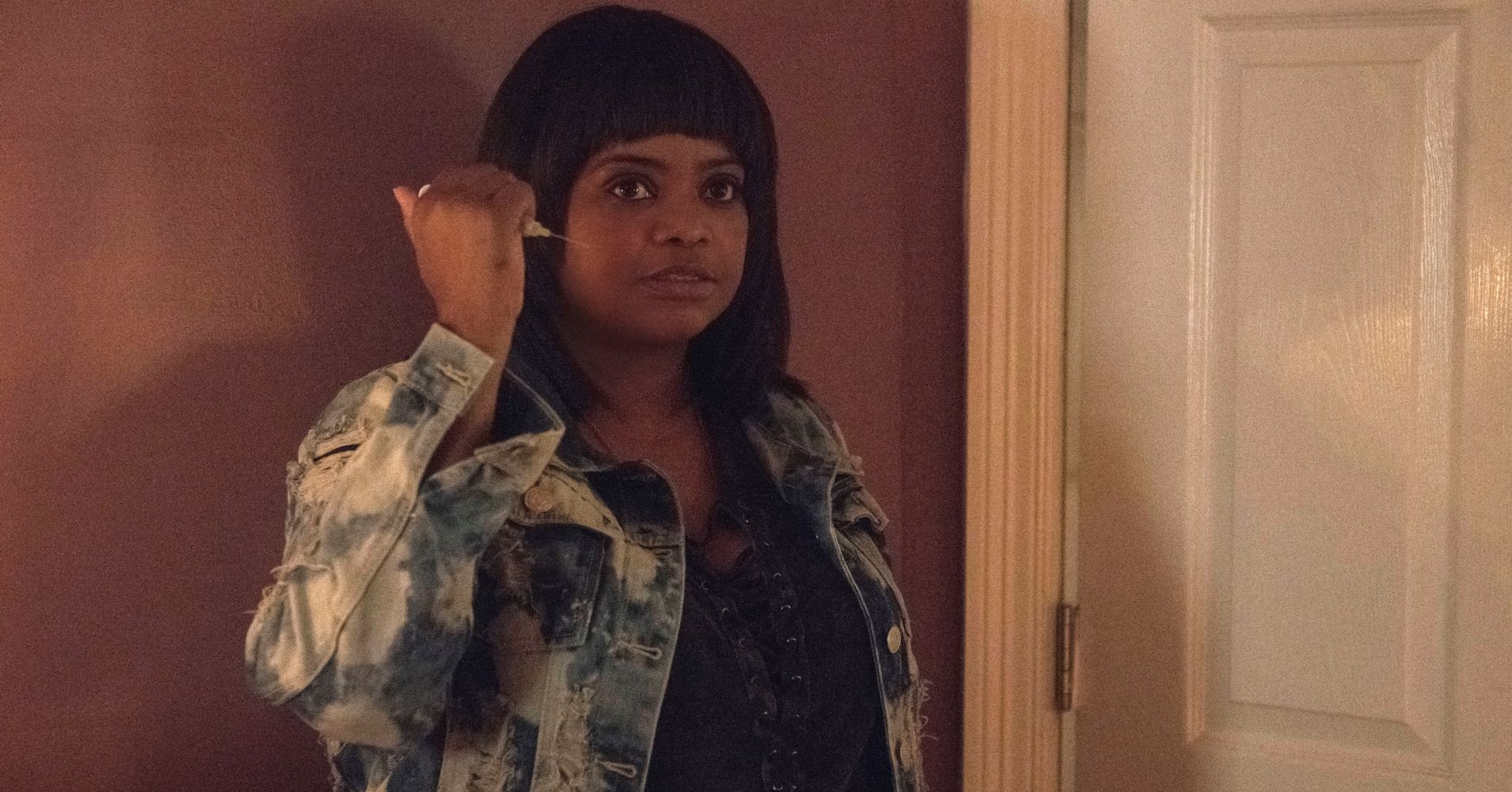[ad_1]
Sue Ann Ellington ― you know her better as Ma ― is unhinged, unpredictable and unfathomable. At first, she’s just a dowdy veterinary technician walking a three-legged dog and supplying teenagers with alcohol from a convenience store. As time goes on, Sue Ann morphs into a torturous, revenge-minded killer who keeps her daughter locked up while nursing trauma from her youth. “There’s probably something wrong with me,” she laughs.
But it’s no joke: There is something very, very wrong with Sue Ann. After seeing “Ma” twice ― I am a sucker for actresses going crazy on-screen, and we’ve watched the gifted Octavia Spencer play the same few roles over and over, so it is finally her turn ― I have many (many!) questions about exactly what that “something” is. How would a mental-health professional diagnose Sue Ann, who suddenly acts on the torment she suffered in high school?
To find out, I called up Paul Puri, a practicing California psychiatrist who also knows a thing or two about storytelling, having consulted on the TV shows “Chicago Med” and “Instinct.” Puri analyzed “Mad Men” and “Girls” characters for Vulture, and he was kind enough to see “Ma” on its opening weekend so I could beg him for a secondhand therapy session. Along the way, we uncovered some hard truths about Sue Ann, as well as a bounty of plot holes in “Ma.” (Warning: Major spoilers below.)
What’s your general impression of Sue Ann?
She is someone who was essentially wounded at a young age, from what we might call in some schools a narcissistic injury or an ego blow or a trauma that makes a part her of get stuck at that age, forever seeking to find a way to repair that experience or repair that wound.
What happened to Sue Ann as a teenager is clearly awful. Does it manifesting in such a violent way some 30 years later ring true?
It’s a little bit of a stretch. I think what they built in was some aspects through which she has been manifesting this for the entire 30 years. She has kneecapped her daughter, so to speak, by impairing her and keeping her locked up. She works with animals and she’s the one kind of in charge. A lot of the assets of what they’ve set up is her wanting and needing to stay in control of a situation.
For example, when she first brings the kids down into the basement, the first moment they talk back to her, she pulls a gun. It’s an immediate “No, I’m in charge here.” And as soon as she’s back in charge and they back down and they’re scared, then it’s like, “Oh, I was just joking.” It’s like she can switch back into that mode. It becomes a progressive experience of how can she play out levels of control and manipulations over other people in the process of staying in control of her feelings and the situation. That’s an avoidance pattern so she doesn’t end up repeating what happened when she was a teenager. She has built these walls and defense mechanisms so she doesn’t feel vulnerable again. I can create an explanation for that that can make it feel fair. When things go off the rails, it feels a little harder to justify, knowing that she’s been living with these people her whole life in the same town. She’s let that go, and now she’s suddenly in a situation where, because of the kids, she’s really derailed in that way. And the kids are relatively innocent.
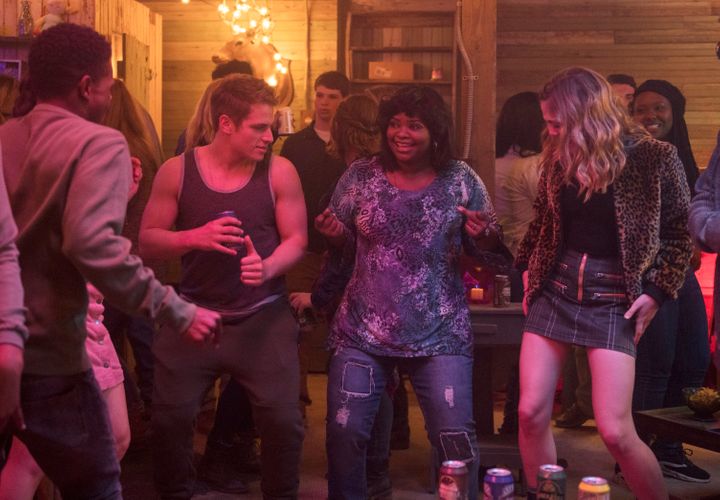
Would you characterize the situation she’s put her daughter in as Munchausen syndrome by proxy?
I would not. It’s possible that there is that off-screen, but the nature of Manchusen by proxy is that you essentially make your child sick for the purpose of gaining attention for yourself. We do know her daughter sometimes goes to school in a wheelchair, but there’s no evidence in the movie that she has used that to benefit herself in terms of “Oh, I have a sick daughter.” So it doesn’t quite fit the Munchausen by proxy component.
There are some other things that could be playing out there. Some parents get extremely jealous if they start perceiving that their child is going to surpass them. Essentially they can do things to sabotage their child and keep them less than they were, so a poisoning would fit with that. There’s an alternative narrative that the movie plays with a little bit that she doesn’t want her daughter to have the same bad experience that she does, so she’s creating a system to keep her from being socialized and being rejected the way she was rejected.
What do you make, then, of how callous she is toward her daughter? Sue Ann doesn’t seem to be doing it out of a sense of affection or protection. She’s very unloving toward her.
Absolutely. We don’t know what happened with her marriage, but it seems almost like she’s resentful toward her daughter. It seems more like she’s trying to keep her daughter at bay. They’ve built a system where I, Sue Ann, want to go have the high school experiences and you’re not allowed to. It becomes, “I’m going to go throw the best parties and do everything I can to be the center of attention and I’m going to keep my daughter from being at the party” because that is presumed to be some type of a threat to her having the experience of being the center of attention. In certain psychoanalytic models, this would be very much about egocentrism and trying to repair the narcissistic injury. It becomes, “I have to overdo it for me to make it for the wound that I’ve felt.”
To what degree do you think Sue Ann knows that what she’s doing is wrong?
At which phase? What I question is, in the beginning, is this a premeditated plan in terms of buying the kids liquor and then it’s going to go down a slippery slope?
I just want to make an aside for a second: In the beginning, what they have her set up as is someone who lives voyeuristically. She buys these kids the alcohol and then she watches their lives on social media. She doesn’t participate, necessarily, but she’s allowed to voyeuristically peep in on what they’re doing. Then she slowly brings herself into that picture by making it about the house. So I think once she brings them into the basement, things are starting to tip toward something much more deliberate, for obvious reasons. But we don’t have the internal narrative, so we don’t know to what level she deceives herself. But she makes this statement to them: “I just want to make sure you guys are safe, not out drinking and driving!” There’s a little bit that’s legitimate about that; you can make sense of it. But then everything from then on is all self-serving.
The only other thing that I would bring up is the turning point ― the moment that actually gets her to say yes to her buying the alcohol ― is when she sees whose van it is. We don’t quite know what’s going on inside. She does some type of calculus for a moment and then she says, “OK, all right, I’m into this,” and it’s because the van is from this guy that broke her heart, basically, and hurt her so deeply. I don’t know if it’s formulated or not, but she could be planning some level of revenge or just to bring herself back into the world right there. There does seem to be some level of planning from that moment on.
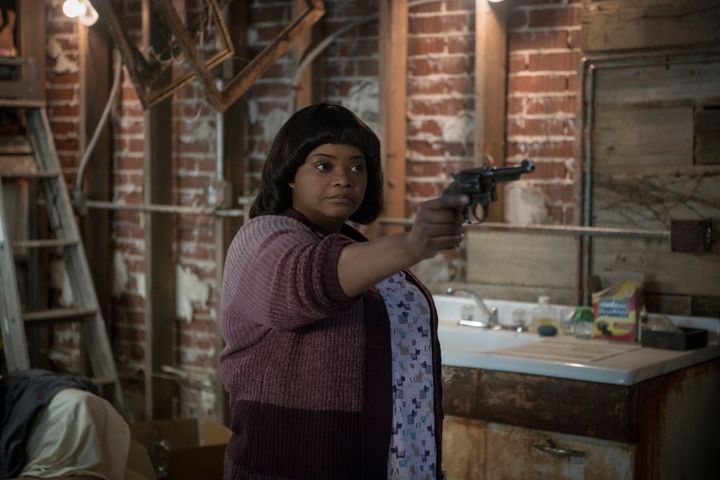
She seems to be an obsessive person. The photos all over her mirror, the way she cuts up the yearbook, even the way she notices that the cat statues have been moved in her living room. What do you make of that and the way it galvanizes her torture scheme?
I think those are two separate but related things. The cats really reflect a nature of trying to feel in control of her life. Anything that she has to do to feel in control of her household she does, including locking her child up and keeping the cats in the right position. When she overreacts is when she feels out of control.
The yearbook, I think, is related, but really gets into the internal process of replaying these traumatizing memories for herself. If you have someone with PTSD or otherwise, they can sometimes replay the memories internally. They don’t go all the way through it, but they will indulge in something. It’s kind of like how many people are drawn to dark works of fiction, like true crime and things like that, after they’ve had some level of trauma in their own life. There’s a level to which we are dabbling in that emotional experience as an indulgence without fully playing out the trauma in our own heads. What we observe in the laying out of the narrative when we see her memories is that, once she does play through the entire experience, that’s when she really goes off the rails. When she gets to the trauma of the closet, I think that’s when she runs over Mercedes. Once she gets to how deep the wound is, it’s, “Oh, they really crushed me, so now I’m going to crush them.”
Based on what we can infer, Sue Ann has never murdered anyone before this. And not only that, but she seems to be a relatively tame person who probably only goes to work and comes home. She somehow hasn’t even run into her old classmates in 15 years, even though they live in the same small town.
The nature of the classic serial killer has what we call conduct disorder behaviors: fire-setting, animal torture — these rehearsal processes leading up to what we would consider more psychopathic characteristics like torture and murder. We don’t have any of that with Sue Ann. What the movie seems to be trying to paint is something a little closer to a revenge fantasy based around something that happened far, far in the past that’s wounding. I would make a comparison, maybe — and I’m comparing fiction to the horrors of real life — to a school shooting, like Columbine, for example. It was these teenagers who felt socially rejected and took revenge in the most horrific way possible. They had so little rehearsal process, and I’m not aware of any psychopathic traits they had leading up to it from a young, young age. It was fueled by social rejection, or at least that’s what they used to justify it.
And now, for Sue Ann, it’s coming out in such an extreme way three decades later. Is there any reality to that? There is, after all, a wave of true-crime shows built around the idea of “snapping.”
I think there are situations where essentially you have a wound that someone has been able to compartmentalize for a long time, and then you have something that unlocks that or pushes them over the edge. I don’t know that that was fully set up in this as justified in my head. The nature of her trying to take a photo with these kids and they’re just stand-ins for the experience she had didn’t quite play out to feel emotionally justified. I think it’s a harder sell. You’d almost have to have her dressing like a teenager and getting into a delusional process of believing that she’s a teenager again for her to be able to fully react that way, but they didn’t quite go there. I didn’t see a new thing that made her snap. There’s also a little thing with when she ran over Mercedes and then she says to Juliette Lewis’ character, “I took out Mercedes for you.” I don’t even know what that meant.
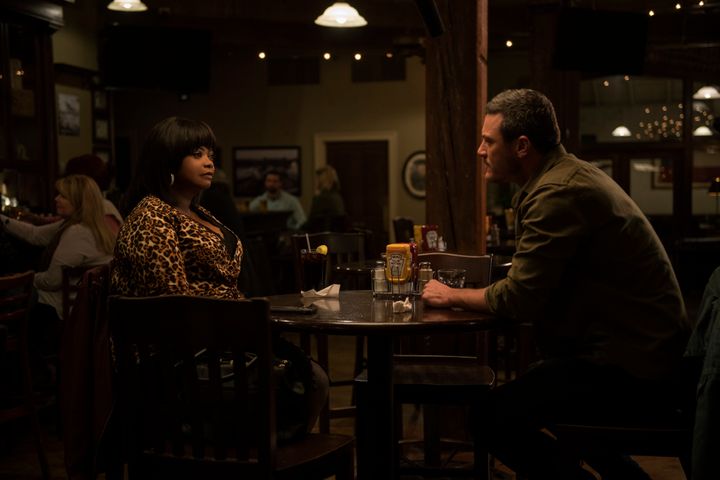
At the end of the movie, Sue Ann has been stabbed and her house is burning down around her, yet she still only cares about getting in bed with her crush, even though he wrecked her life and is now lying dead in a pool of blood. How do you make sense of that?
Artistically, I can sort of tie the psychology to it by saying she has exacted her revenge by killing him and she has exerted control over him by killing him, so there’s a level of emotional math that plays out. Essentially, “You’ve wronged me, and now I’ve wronged you in return and we’re even. Now I don’t have to hold any resentment anymore because we’re done.” Sometimes what you have in therapeutic work is someone vents the anger that they have, and as soon as they’re done venting that anger, they get in touch with all of this depression and tears. Those are the feelings that are there underneath the surface. Here, I could imagine that, beneath the anger she has, she still has love for him, or the teenager version of him.
Is Sue Ann someone you could treat? She doesn’t seem particularly interested in getting in touch with herself.
The most difficult phase for Sue Ann, as you’re saying, would be her interest in getting treatment. It’s difficult but not impossible to treat someone who doesn’t want to be there. What I would say is that she can probably get the most treatment before these teenagers enter her life because everything is contained and she doesn’t have the fantasy. If you’re talking about the woman who’s been stabbed and is walking through the burning house like nothing’s happening and seems unaffected by the knife in her back, I think that’s a really hard case to try to treat.
Did any of Sue Ann’s methods of torture strike you for any reason?
I mean, the iron was a little weird. I think the stitching up of what’s-her-name’s mouth started to play with this poetic, “Saw”-related approach of “your sins are going to come back to revisit you, and I’m going to be the judge and the executioner.” But again, it’s sort of not quite there. They did that a little bit, and then everybody else was tied up at the neck. It was a half-step.
Is her attraction toward this underage boy merely a displacement of the attraction she feels toward his father?
Yeah. What to think about is that if someone has a trauma — and sometimes we even call this a little-T trauma versus a big-T trauma; a big-T trauma is something life-threatening, or seeing someone killed, or sexual abuse, which you can make an argument that she experienced, and a little-T trauma is a smaller hurt that happens, like in a family situation — part of you gets stuck at that age. We have inside of us parts of us that are living in a different age and playing out things at a different age. So she has a part of her that’s still a teenager and has never gotten over that. Part of that’s been kept in a box, much like she keeps her daughter in a box, but now it’s being let out to play.
That is a reality: Many people get stuck in patterns in their lives because they’ve had these little-T traumas. It could be a breakup, and they spend much of their life repeating patterns around that small trauma, trying to undo it or correct it in some way. And they don’t even consciously know that they’re doing it, but it’s because that part of them is stuck at that age and trying to find some way to fix it but they don’t know how.
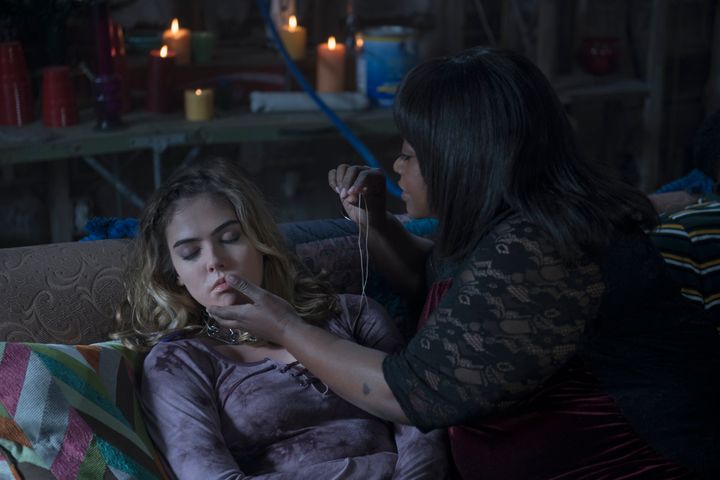
Are you mad at me for making you go see this movie? I know it’s schlocky, but that’s part of why I enjoy it.
No, it was fun. It was interesting reading Octavia Spencer’s take on why she did the movie, which is she’s a big fan of horror and psychological thrillers. Who would have known?
It’s very much not the role you expect to see her in, which is part of what makes it so enjoyable.
I think her performance is fantastic. She sold every single moment. She gives it gravitas at every moment. It’s a real credit to her performance, being able to play this character that is slightly unidentifiable from her backstory, yet you’re still willing to stay with her, even as she goes off the rails.
Anything else that struck you about “Ma”?
It’s unclear what’s going on with Maggie in terms of Sue Ann’s identification and competition with Maggie. There are times when she seems to be on Maggie’s side, like defending her or protecting her, and I didn’t really get where that came from. There’s nothing about her backstory that made it seem why that would make sense.
There’s the other thing about race. I don’t know if it wasn’t written for an African-American character.
It wasn’t. It was written for a white actress.
Yeah. It seems sort of slapped on at the last minute, with the white face on Darrell. It doesn’t seem like that necessarily was there, but it definitely is a prominent aspect of the film. The fact that all of the white characters in the past essentially exploited this young, vulnerable black girl is a real racial commentary about society then, and continuing into society now. They used her as a means for their own enjoyment in terms of getting alcohol and other things. That obviously wouldn’t land as well because they have a friend at their peer level who they do treat equitably, so that’s the downside to that sort of critique. But I just wanted to make sure it’s mentioned because I think it’s important.
It feels like the movie is working hard not to be about race, but it’s impossible given the context of what happened to Sue Ann and the people she’s now surrounding herself with, who are predominately white.
Exactly. Are there other black characters beside Darrell?
I think he’s the only one.
Then it’s just tokenization. That becomes its own commentary. If it were 50/50 or mixed races throughout, it would be less of an issue.
For what it’s worth, the director, Tate Taylor, said there’s a comment on that aspect of the film right before Sue Ann paints Darrell’s face, when she says something like, “There’s only room for one of us around here.” He sees it as a commentary on how most Hollywood movies only have one black character.
[Laughs] Sorry. So he’s commenting on his own use of only one character in the film? Got it.
This interview has been edited and condensed.
REAL LIFE. REAL NEWS. REAL VOICES.
Help us tell more of the stories that matter from voices that too often remain unheard.
[ad_2]
Source link

